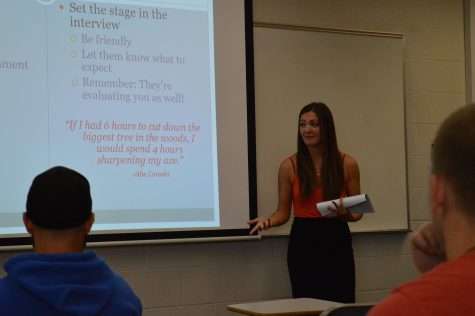Psychology Club hosts Psychology in the Workplace discussion
Todd Manson, assistant professor of psychology, discusses organizational topics in psychology.
September 30, 2016
Many subjects are applied in the workplace. One of these subjects is psychology.
The Psychology Club hosted a “Psychology in the Workplace” event in Crestview room 206 on Wednesday, Sept. 28. The event, which took place during the Industrial Psychology class, lasted an hour and consisted of many explanations about how psychology is incorporated in the workplace.
Todd Manson, assistant professor of psychology, began by talking about interviews and how companies decide to hire their potential employees.
“What organizations do is they figure out how to hire people,” Manson said. “And they’re like, ‘what kind of people do we want? We want people with abilities.’”
Erin Bishop, interdisciplinary studies graduate student, said she is currently enrolled in the Industrial Psychology class and said she was interested in the event that took place during the class.
“I’m interested in assessment in the workplace and employee selection too,” Bishop said.

Erin Straub, training and development supervisor at 360 Care and IUS psychology and economics alumna, started off by mentioning her work experience during her time in college.
“In 2014 I ended up making the switch and I went over to 360 Care,” Straub said.
360 Care is a company that provides health care services to multiple areas in ten different states. Straub went on to talk about how 360 Care has grown from her time of being there.
“What started out with a department of seven people providing services in about four states,” Straub said. “[360 Care] has become a department of a little over 50, servicing ten states with five specialties that we provide.”
According to Bishop, psychology in the workplace could be applied to anyone in the workplace.
“It affects you if you’re an applicant,” Bishop said. “It also affects you if you are in a position where you are potentially hiring people.”
Straub said psychology begins to come into effect in a workplace when interviewers are searching for potential employees.
“It all starts with hiring,” Straub said. “For us, that means conducting behavioral-based interviews.”
Straub said the expectations everyone should expect when coming into a behavioral-based interview are:
- The interviewer will be prepared. They will have the interviewee’s resume out, along with a pen and paper to take notes on during the interview.
- The interviewer will have already examined and looked over the resume before the interview takes place.
- The interviewer will have all of their questions already prepared.
- The interviewer will make sure that the interview takes place in an appropriate environment, such as an office.
While presenting, Straub mentioned the types of questions she likes to ask during her interviews.
“We’re going to want to avoid the ‘What would you do if?’” Straub said. “You can tell me what you’d think you would do, but I want to know what you’ve actually done.”
Yes or no questions were also one of the types of questions Straub said she would avoid when doing an interview. She also said she doesn’t try to hire someone who is a friend.
“Of course we could want someone that we could work with every day,” Straub said. “But we want to make sure not to hire someone who would be our friend or a reflection of us.”
Straub said although she does take some of her employees out for lunch, she doesn’t do anything more with them because she wants to maintain that boss-employee relationship.
While Straub talked about interviewing in psychology, she said there are some questions interviewers cannot ask due to legality issues. The questions interviewers cannot ask are questions regarding:
- Age
- Arrests/Convictions
- Availability for Work
- Citizenship
- Clubs/Associations
- Family
- Financial Status
- Gender
- Language Skills
- Level of Education
- Medical Conditions/ Disabilities
- Military Record
- Physical Attributes
- Race
- Religion
- Sexual Preferences
Straub said that any interviewer needs to be well-rehearsed in the legality of the questions that they are asking during an interview.
“It’s very easy to fall into those things,” Straub said. “So make sure you feel very well-rehearsed in those.”
Giving positive feedback was one of Straub’s favorite subjects to discuss.
“I love positive reinforcement,” Straub said.
After someone is hired, Straub said she has her new employees fill out a form that will ask them what their favorite reward is, and if they do a good job at something. Straub said she likes to treat them to that.
“Time with their manager is very big,” Straub said. “I know that I have a couple people that every time they do something good, ‘I’m baking brownies that night.’”
Straub said she also goes around her workplace and will share with other people, and maybe even her boss, what a great job someone in her department may have done.
“Sharing that praise with someone who may be giving out the promotions, and gives out raises, is going to mean a lot to somebody,” Straub said.


